A TRAVEL GUIDE TO SANTORINI ISLAND, GREECE
[PART 1|3]
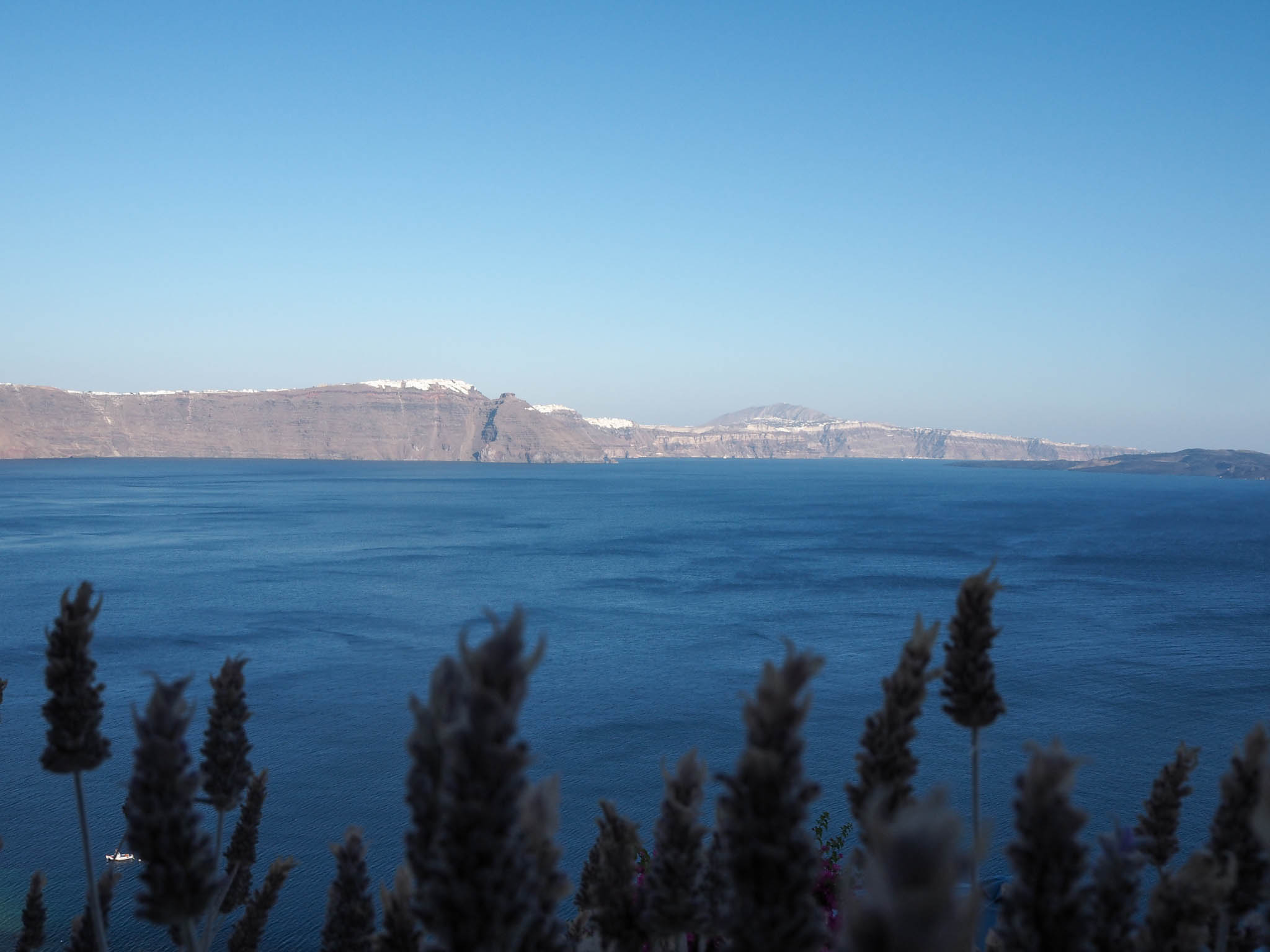
There are places in the world that stay in your memory for ever. It could be that their vivid colours, breathtaking landscapes and distinctive architecture are unlike anything you have seen before. Maybe you were touched by their long and eventful history, fell in love with the scrumptious cuisine or just appreciated the friendliness of the locals. Santorini is one of those places.
Whether you are planning to spend your whole summer holiday in Santorini or you are visiting the island as part of an once in a lifetime tour of Greece, this is the blog post you need to plan your visit to Santorini. And in case you are wondering… Yes, there are many places around the world that are not worth the hype. Santorini is worth it.
WHY VISIT SANTORINI?
With its rich nautical blue seascape and one of a kind volcanic caldera, gleaming white buildings and red-hued soil, Santorini is both a natural and manmade wonder. Whether you are admiring the views of the caldera from the dizzying heights of its capital Fira or the delightful alleyways of Oia, the experience is jaw dropping and unforgettable, as is the moment you first arrive on the island by boat. Furthermore, there’s the island’s evocative history and scrumptious local produce such as tomatoes and wine and, if I may so, the Greek flair! Visiting Santorini is justifiably a bucket list experience.
Santorini would be worth visiting even for half the amount of experiences and sights that it offers. Yet, this island has it all. Whether it is stunning natural landscapes that you are most into, wonderful traditional architecture, scrumptious cuisine and renowned winemaking, there is something that will captivate every kind of traveller.
READ MORE:
Santorini: Bold, beautiful & absolutely worth it – Top 7 things to do
Santorini: Bold, beautiful & absolutely worth it – Oia travel guide
SO, HOW BUSY IS, IN FACT, SANTORINI?
If this is your first trip to Santorini, you may be worried about over-tourism. It is true that the amount of visitors that the island receives is staggering. The main issue is, of course, created by big cruise ships releasing large amounts of people in one go. You may have seen images of Santorini streets rammed full of people elbow to elbow. While these pictures are true, they do not tell the whole story.
While the island is very busy during the summer season (as are all popular spots in the Mediterranean), overcrowding happens only at specific locations during specific hours. This is by no means the situation in the whole island all the time, and there are ways to get around these ‘traffic jams’ (more on that next). Nevertheless, if you think that this will have a detrimental effect to your stay, avoid visiting the island during high season, mid-June to mid-September.
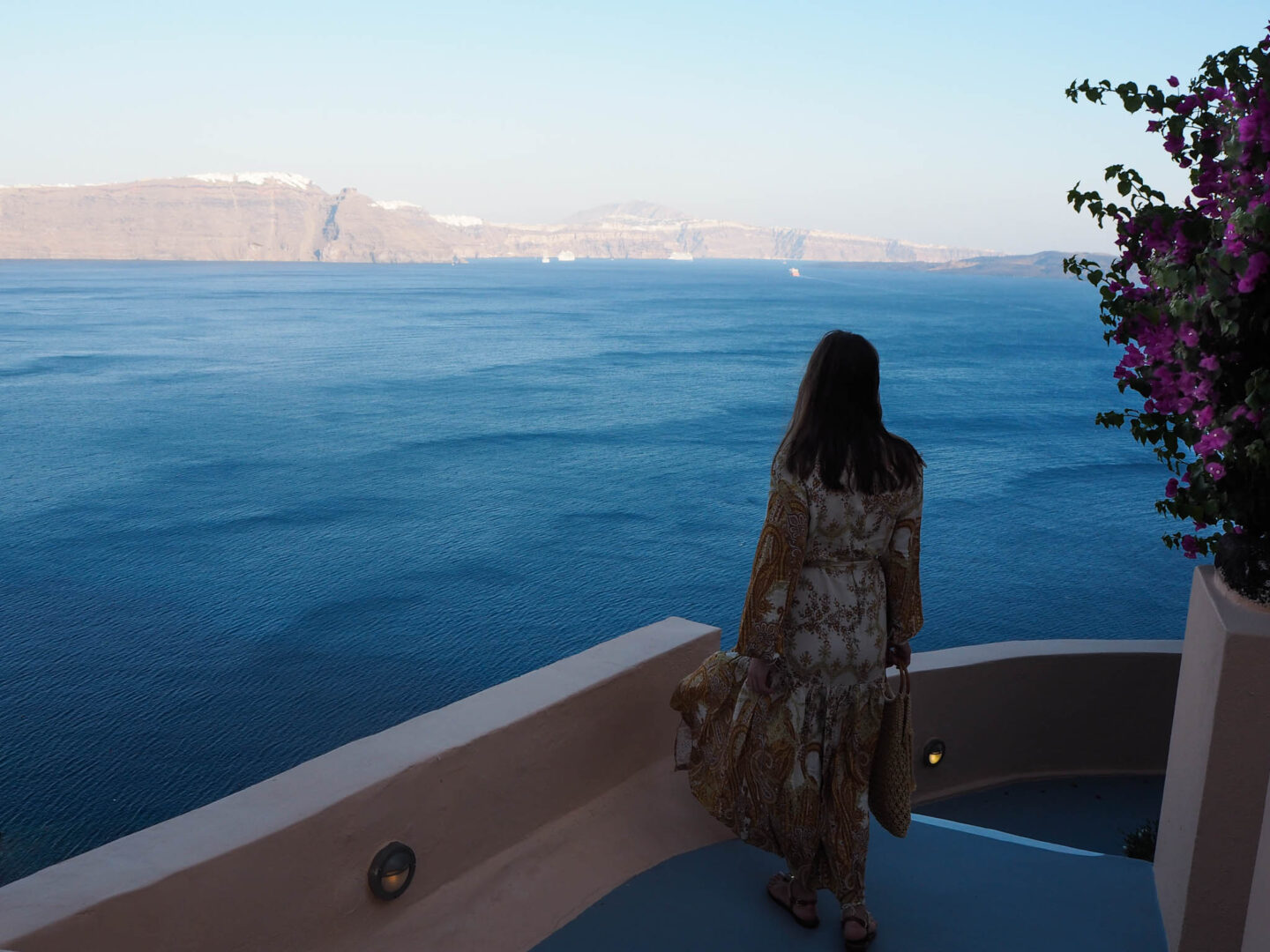
WHEN IS THE BEST TIME TO VISIT SANTORINI?
SANTORINI DURING HIGH SEASON
This is the period between (early to mid) June to mid-September.
During this time, the weather is perfect for swimming during the day and outdoors dining in the evening. Chances of precipitation are very low and, even with mid-summer high temperatures (28-30°C), the weather is generally pleasant as it’s usually breezy, especially in the evenings. From the whole summer season, July and August will be the hottest months.
High season is the busiest time in Santorini with hotel prices and visitor numbers at their highest.
SANTORINI DURING SHOULDER SEASON
April, May, very early June, mid to end of September and October can be considered as shoulder season in Santorini.
Santorini is probably the one Greek island I would recommend visiting during shoulder season. This is, in fact, a strong recommendation if you will not island hop or if you are also visiting Athens and the mainland which can be very hot in July and August. However, if you are planning a whirlwind tour of the Cycladic islands, including some off the beaten track gems, you might want to aim for early June and late August rather than miss out on summer all together.
Naturally, the more you move away from the summer months, the more likely it is that swimming in the sea may not feel that appetising. Nevertheless, the islanders do insist that the sea is warmer in September and October (I have yet to try this!). In any case, this might not be an issue for you if you are not much of a beach bum.
Sunny skies and comfortable temperatures are the norm in late spring and early autumn and quite common in early spring and late autumn. So, the climate continues to be perfect for sightseeing and adventure travelling and will make for a blissful break from the miserable weather elsewhere in the northern hemisphere.
EASTER IN SANTORINI
Easter in Greece is quite a special time of the year. There are many activities that take place based on customs and traditions revolving around religion, the arrival of spring and, of course, food! In Santorini, the village of Pyrgos is lit by thousands of candles to accompany the traditional procession that takes place on Good Friday. On Easter Sunday, lunchtime feasts with lambs roasted on spit fires are being held in courtyards and terraces throughout the island, and the country.
Note that Greek Orthodox Easter does not usually coincide with Catholic Easter; they are frequently one week apart.
SANTORINI IN WINTER
I hesitate to recommend visiting Santorini in winter, unless you are writing a book and wish for complete solitude. Or you are super into alternative travel. It’s not so much that the weather is completely off rather that most businesses are shut or preparing for the summer.
Nevertheless, the Greek government is working hard towards positioning Santorini as a year round destination by incentivising businesses to stay open year round. I suspect with every year that goes by, winters in Santorini will become less lonely. If you are travelling to Santorini between late November to early March, you are a trailblazer indeed and I really look forward to hearing all about your trip!
TOP TIP: GREECE CLIMATE & WEATHER
The National Meteorological Service in Greece has a weather station in the neighbouring island of Naxos. Its historical data, including mean, max and average temperatures, precipitation etc are presented by month, in an easily digestible manner, here. This is a good source of information for the climate of all Cycladic islands. I also talk about climate, weather and the ‘Greek summer experience’ on my blog post about the best time to visit the Greek islands.
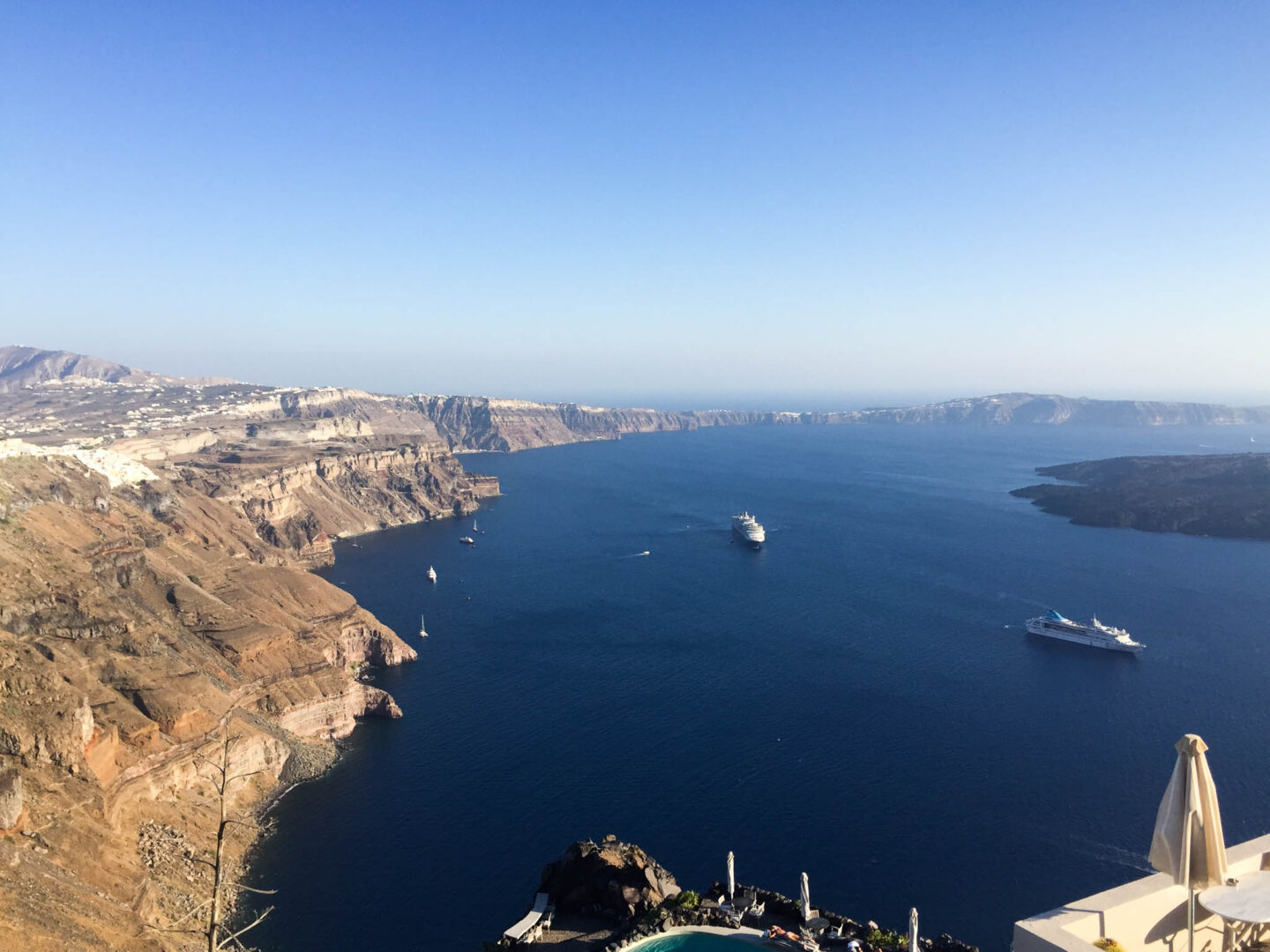
PRACTICAL TIPS FOR AVOIDING THE SUMMER CROWDS
If you are travelling during the summer months, there are a few simple ways to enjoy the island in a more relaxed pace:
- The crowds are mostly in Fira and Oia: Visit Santorini’s most famous villages early in the morning, be flexible with lunch and dinner times and book restaurants ahead of time.
- Get off the beaten track: Explore the relatively unknown but beautiful Cycladic villages of Pyrgos, Megalochori and Emporio.
- Enjoy the iconic caldera views from anywhere but the centre of Fira or Oia: Santorini’s famous croissant shape creates so many viewpoints that you don’t have to elbow your way to an instagram-worthy spot. Consider doing all or some of the classic hike between Fira and Oia. Similarly, any location to the southwest of Fira will offer incredible views and a more relaxed pace.
- Hop on a ferry to Santorini’s sister island: Thirasia is still blissfully relaxed, old school and peaceful. Also, if you don’t arrive to Santorini by boat and don’t intent on visiting the volcanic park or having any sort of caldera cruise, this is the perfect way of seeing Santorini from sea level, which is a whole other level (literally and metaphorically) of wow, wow, wow.
- Enjoy the sunset from anywhere but Oia (or skip it completely if you are just doing it because it’s on everyone’s bucket list). A lot of people would argue that Thirasia island or Pyrgos village offer exceptional viewpoints equal, if not better than Oia’s and zero crowds. If you are planning to go to Oia for sunset, make sure to read all about my experience of watching the sunset in Oia to see if that’s something for you.
…AND IN CASE YOU ARE HAVING SECOND THOUGHTS…
I hope I didn’t scare you into avoiding the island all together. This would be such a pity, honestly! If you browse my Greece section, you will see I mostly write about off the beaten Greek islands which I love visiting. I have also travelled to several other incredible places around the world. Despite all that, and having visited Santorini multiple times over many years, I still think that there is no other place like it.
Lastly, you might have heard that Santorini is overtaken by tourism and it’s not real Greece. I don’t agree with that. There are many facets to any country and, in Greece specifically, the hospitality industry goes hand in hand with ‘real life’. Santorini is the island with the largest increase in the number of permanent residents in Greece. Many Greeks also visit the island for their holiday and even get married or honeymoon there! So, while you will see people from all around the world in Santorini, rest assured that you are not entering Barbie Land. If you do decide to visit Santorini, I bet you will have a wonderful time!
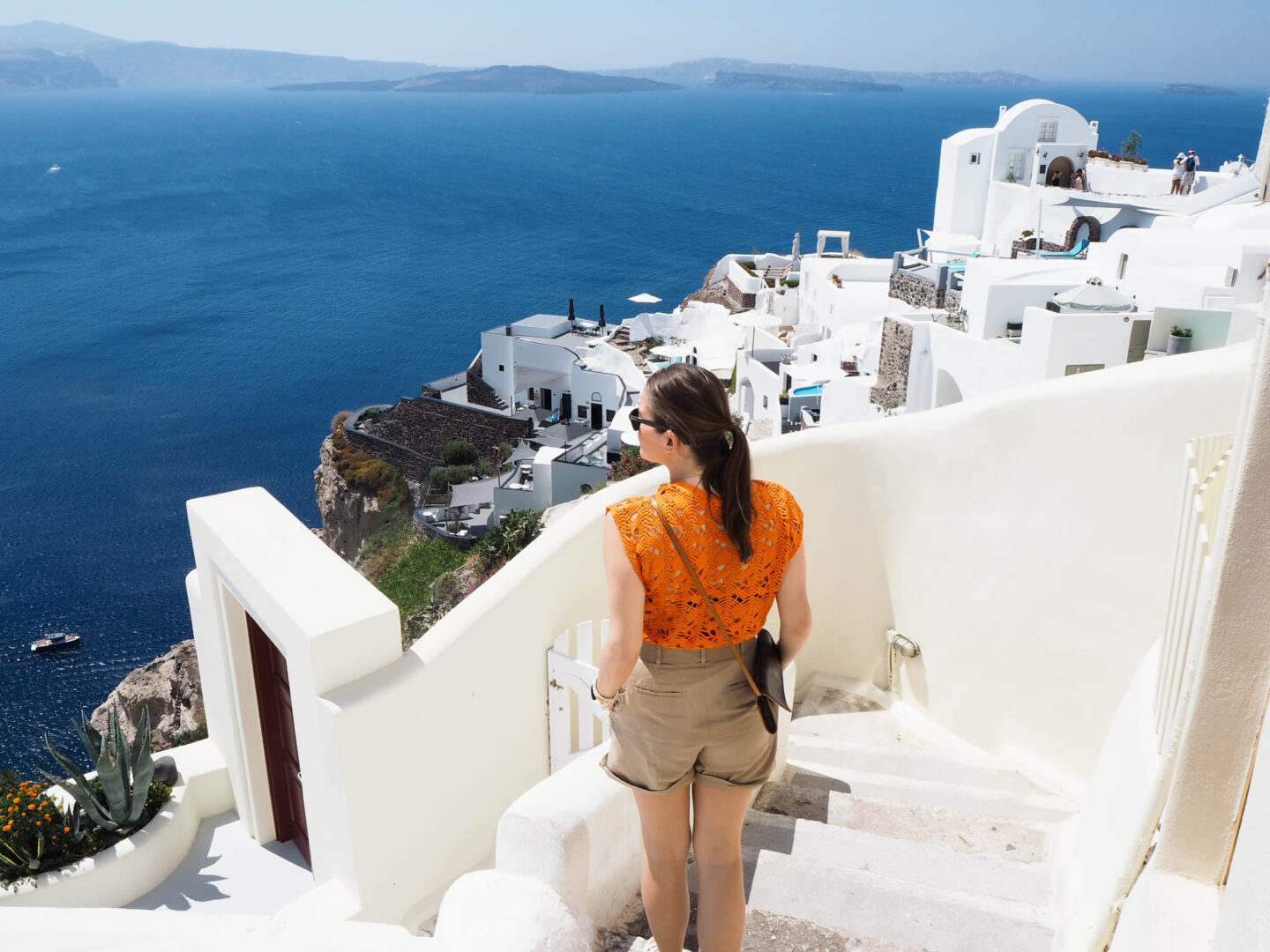
SANTORINI FOR BUDGET CONSCIOUS TRAVELLERS
In the last decade or so, Santorini steadily features in the category of luxury destinations. The breathtaking views along with the fact that the island is considered a worldwide proposal, wedding and honeymoon destination have created the perfect environment for the luxury traveller to feel right at home! But what about someone who doesn’t want to spend thousands of euros / pounds / dollars on a weekend in Santorini? I am not talking just about backpackers here (though they should keep on reading too). Flashpackers can be budget conscious too!
There are two simple ways to enjoy your trip to Santorini without breaking the bank:
- You don’t need a room with a plunge pool and a view of the caldera to enjoy Santorini. Honestly. There are many brand new boutique hotels and quite a few historical guesthouses that don’t overlook the caldera and offer incredible value for money. Many also have really nice views too, just not of the caldera!
- Don’t stay in Fira, Oia or Imerovigli and don’t have every single meal there. There are many traditional tavernas all around the island that offer good food in typical Greek prices and use the incredible local produce of Santorini and the neighbouring islands. Also, don’t miss the chance of enjoying Greek street food. It is super tasty, customisable (and, of course, safe) and part of the experience.
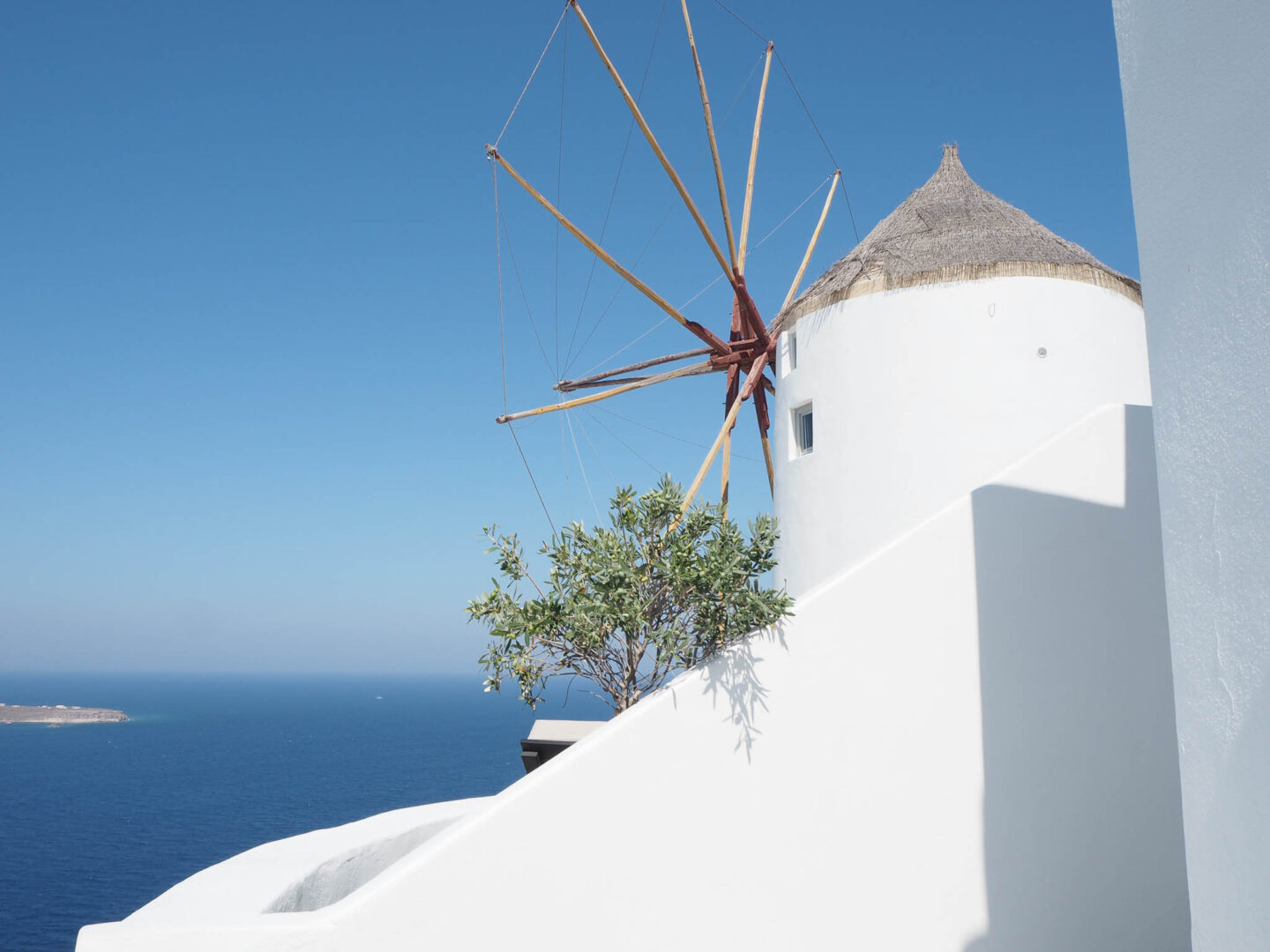
HOW TO GET AROUND SANTORINI?
DO I NEED TO RENT A CAR IN SANTORINI?
Santorini is large enough for car rental to make sense, though there are ways to get around without renting a car, if you do not wish to. Needing your own car in Santorini depends on the kind of holiday you wish to have, the amount of days you will stay and the location of your accommodation.
If you are only visiting for two to three days, you could easily get by without a car, especially if you are based in Fira, Imerovigli or Oia. If you are staying for more days than that, you will have enough time to explore a big part of the island hence a car will come in very handy.

Driving times:
Fira – Oia: 25min
Airport – Fira: 10min
Port – Fira: 20min
Fira – Red beach: 25min
In high season, driving times will most likely increase due to traffic.
TAXIS & BUSES IN SANTORINI
There are plenty of taxis on the island, though you may find them a bit more expensive than taxis in the mainland. During high season, I would strongly recommend pre-booking any time sensitive route. It’s also worth noting that the taxis waiting at the taxi rank at the airport are numerous, yet, occasionally, not enough, so you may have to wait for a bit. As a reference, a taxi ride from the airport to Fira will cost about 20-30€.
In Greece, regional buses are known as KTEL and in Santorini their network covers almost the entire island. Services are fairly frequent with routes to many villages, archaeological sites and beaches and are very affordable. You can find the timetable online but it is also posted at the bus stop which is worth double checking once you are there. During high season, buses can get quite crowded, especially for Fira, Oia and the beaches.
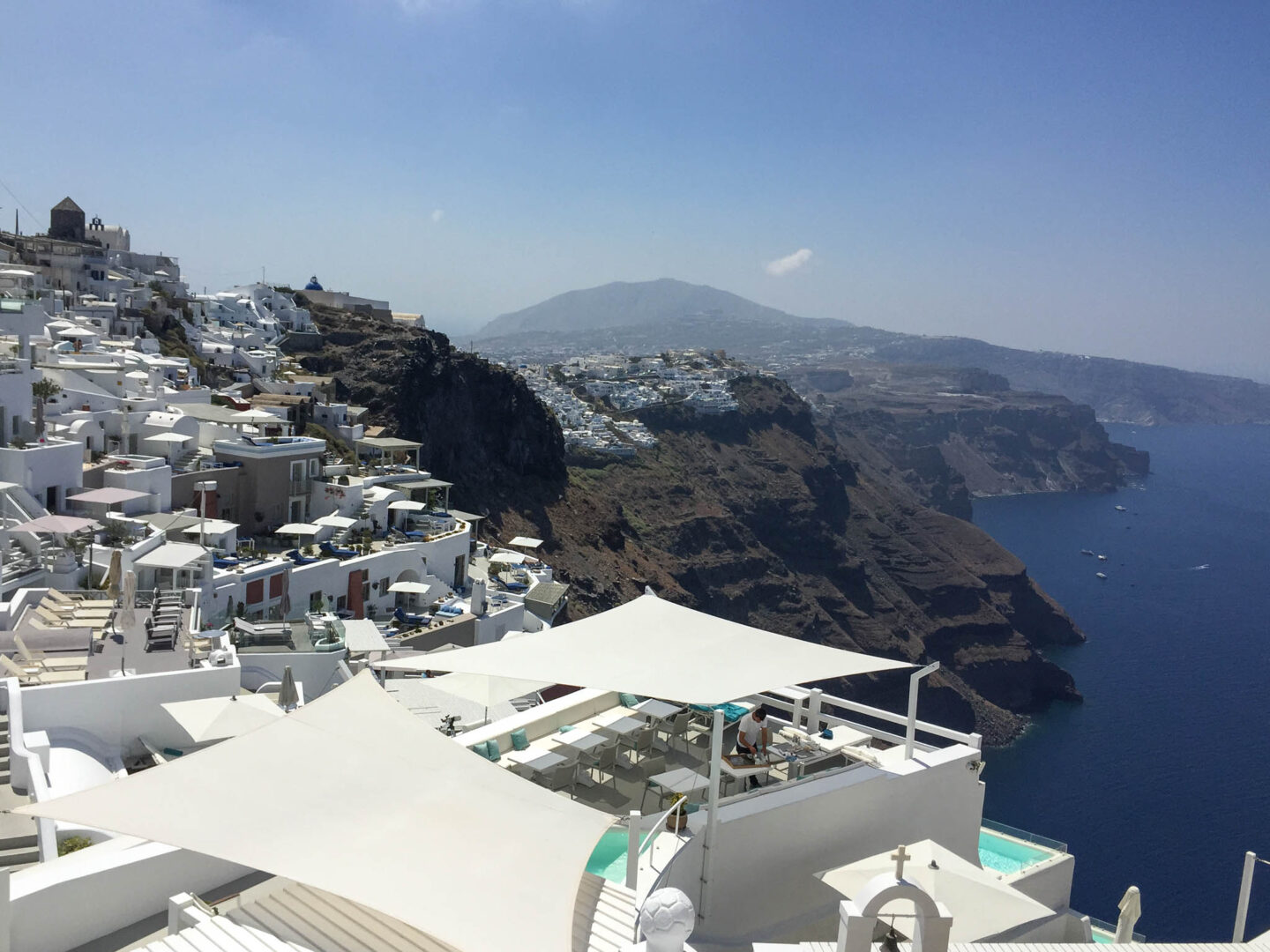
HOW MANY DAYS SHOULD I STAY IN SANTORINI?
As you will see in Part II & III of my Santorini travel guides (top 7 things to do + guide to Oia), there are plenty of unique experiences and sights to keep you busy for many days. Exploring the volcanic park in the caldera, enjoying the traditional architecture and culinary delights, discovering some of the least known villages, swimming in volcanic beaches, wine tasting and so many more wonderful experiences are easily accessible while in Santorini.
So, in my opinion, a week in Santorini is a good amount of time to explore the island and, of course, relax. If you enjoy spending time on the beach or just wish to travel slow, a week can easily become 10 days or more! If you are not much of a beach person, four to five days is also a decent amount of time to see most of the island.
Nevertheless, Santorini is definitely worth visiting even if you don’t have a whole week at your disposal. While there is so much more to the island than just the iconic caldera views and the streets of Oia, I fully acknowledge that the temptation to visit other Greek islands or the mainland on the same trip is strong, especially if you are not based in Europe. Indeed, an once in a lifetime trip to Greece is not complete without a visit to Santorini, and if that means that you only spend 2-3 days on the island, then so be it.
THE DILEMMA OF A SHORT & SWEET STAY
On the whole, I find it quite hard making a recommendation about how many days to stay in Santorini. I am generally a fan of slow travel and do not really like staying in a place (any place really) for a day or two, let alone a place like Santorini where there is quite a lot of things to see and do.
Many travel writers and bloggers will recommend staying on the island for two days maximum mainly because of how busy it is during the summer months. There is a logic to this, for sure. However, I believe that a short stay will also make you more stressed about packing a lot of activities in a short amount of time and that is the worse way to go about an already busy place. In my opinion, the best attitude in these situations is being flexible and relaxed and this is easier if you have time on your side. I live and work in central London, so I know this from experience!
So, unless your only goal for the trip is to take a selfie in front of the caldera, it’s worth taking a moment and really think about what it is that you want out of your trip to Santorini before booking your return tickets.
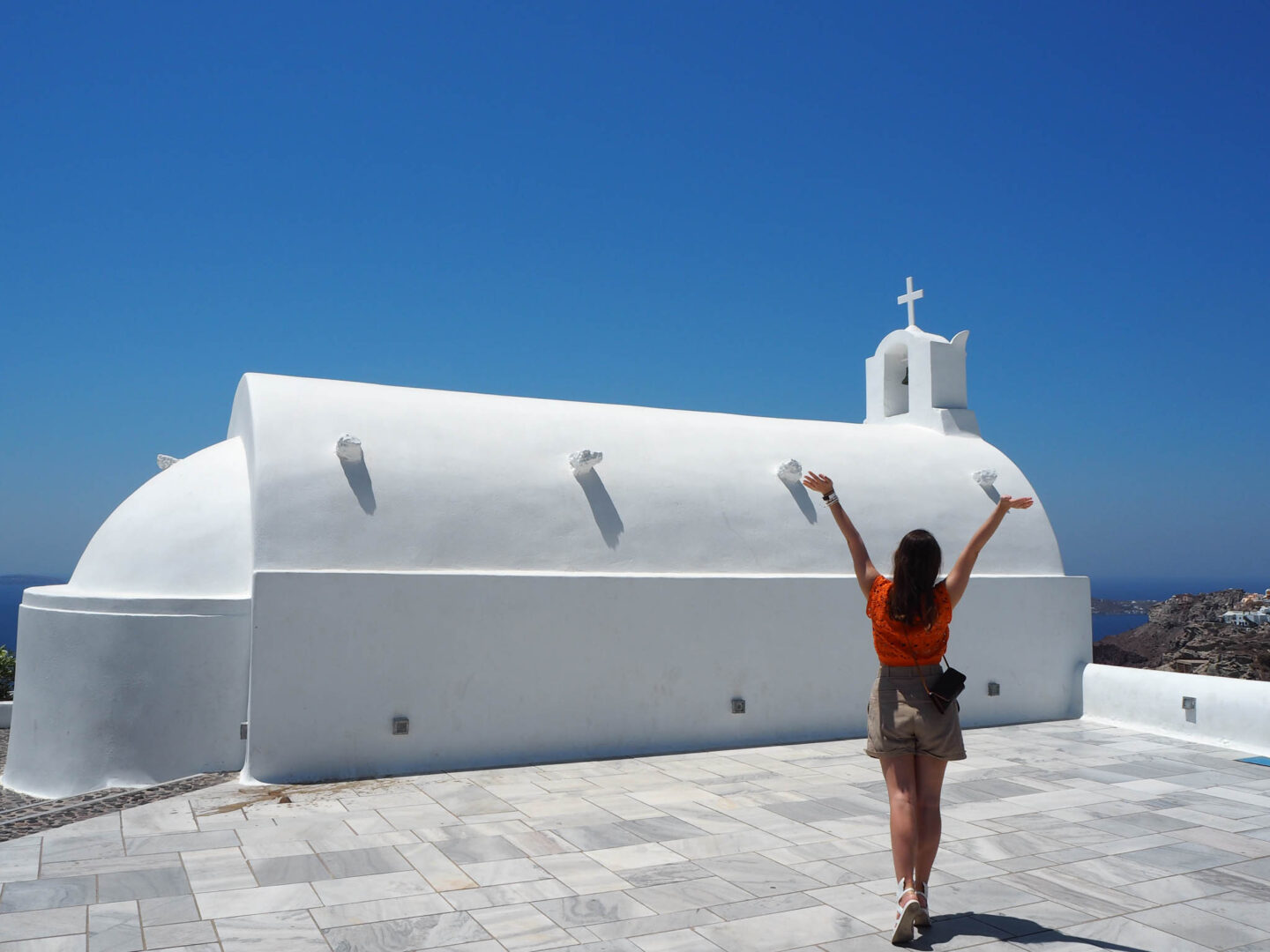
HOW TO GET TO SANTORINI? ISLAND HOPPING TIPS & ITINERARIES
Santorini is quite easy to get to, even from abroad. The island’s international airport connects it with direct flights to many European cities in the UK, Scandinavia, France, Germany Italy, Spain and more. Needless to say, air connections are more numerous during high season.
Naturally, there are direct flights from Santorini to the Greek mainland too, more specifically Athens and Thessaloniki. These flights are less than an hour long, so if you do find yourself in need of a break from the hustle and bustle (and heat) of a Greek city, visiting Santorini is always a good idea.
If flight timings don’t work, or you prefer a boat ride, you can catch the high speed catamaran (5h) or conventional boat (7-8h) from Piraeus, Athens’ main port.
Whether you arrive by air or sea in Santorini, my blog post ‘Travelling to the Greek islands -Athens airport & ports FAQs‘ will come in handy.
ISLAND HOPPING FROM SANTORINI
Santorini is the southernmost island of the Cyclades which makes it the perfect start or end to a thrilling island hopping trip whether by public ferries / catamarans or a private boat.
From Santorini, you can easily head towards other famous Greek islands such as Mykonos and Paros or discover some off the beaten track gems such as Koufonisia, Amorgos, Anafi or Folegandros. Whatever floats your boat, is probably not that far from Santorini and I have covered it on my blog post: Santorini island hopping: 5 amazing itineraries to easily do on your own. Make sure to check it out!

HOW TO BOOK BOAT / PLANE TICKETS TO THE GREEK ISLANDS
I am fully aware that for non-Greeks, checking itineraries and booking ferries or planes for the Greek islands may sound complicated and overwhelming. But that’s what I am here for!
I have explained all about boat services, planes routes and island hopping in the Cyclades and Dodecanese islands in the blog posts linked below. If you are travelling in July or August, I would recommend booking boat and plane tickets early -May at the latest. Most bookings can be made online.
PS. Transiting to the islands via Athens? Make sure to read all about Athens’ airport and ports and how to get from plane to boat and vice versa:
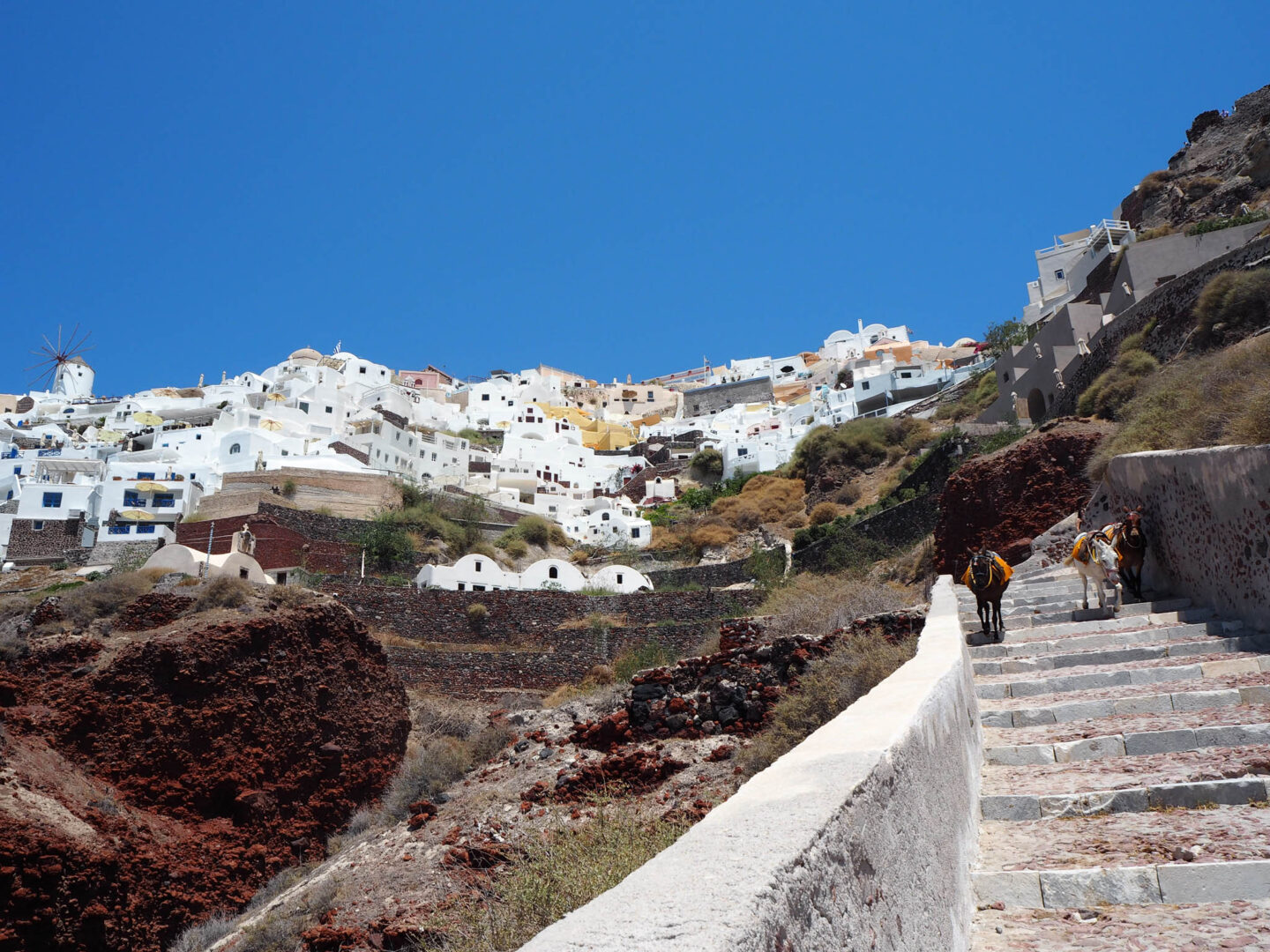
FINAL THOUGHTS: THE REST OF MY SANTORINI TRAVEL GUIDES
So, this concludes part I of my Santorini travel guides. I hope that you are now acquainted with the island and have all the necessary practical information to start booking your trip. In Part II, I talk about the top 7 things to do in Santorini whereas part III is my guide specifically for the beautiful village of Oia. Lastly, if you are thinking of island hopping, check out these 5 amazing island hopping itineraries from Santorini.
See you on the next one!
This is not a sponsored post & I am not affiliated with any of the hotels, restaurants or organisations mentioned.
A DEEP DIVE INTO GREECE
Looking for more travel guides for Greece? Or maybe just tips, inspiration and practical advice for effortless travel and authentic experiences? Hit the buttons below!
___
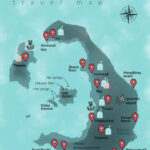


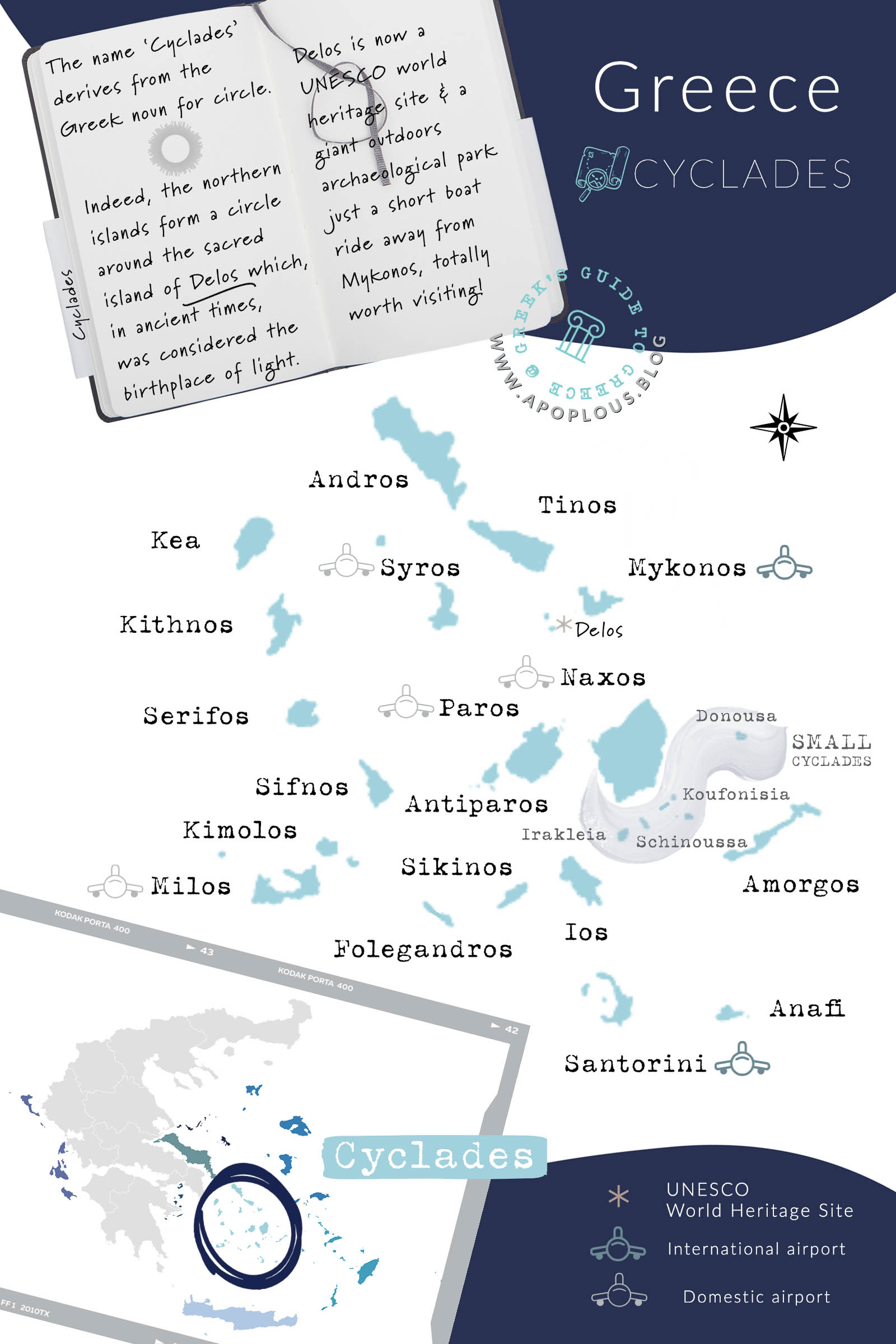






Your ‘Santorini: Bold, Beautiful & Absolutely Worth It – Trip Planning Guide’ is an absolute revelation! Your vivid descriptions and expertly curated tips bring Santorini’s bold beauty to life. From iconic sunsets to hidden treasures, your guide navigates every facet of this enchanting island with finesse. The depth of your insights, covering accommodations, activities, and local experiences, showcases a profound understanding and passion for Santorini. Thank you for crafting such an immersive and informative guide – it’s a compass for travelers seeking the quintessence of Santorini’s allure, ensuring an extraordinary and fulfilling journey through this captivating paradise!